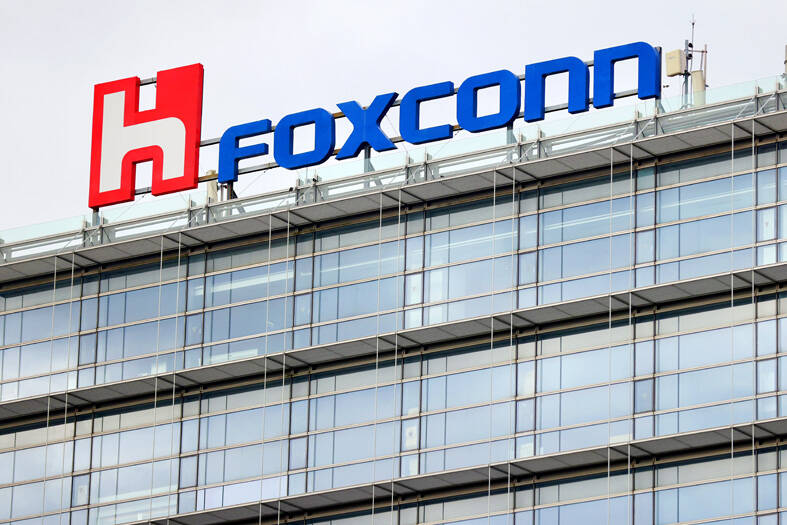Hon Hai Precision Industry Co’s (鴻海精密) consolidated sales slid last month, reflecting uncertainty in its business after Beijing launched an investigation into the world’s biggest iPhone assembler.
Apple Inc’s most important partner, also known as Foxconn Technology Group (富士康科技集團), reported a 4.56 percent year-on-year decline in revenue to NT$741.2 billion (US$23 billion) last month, the company said in a statement.
On a monthly basis, revenue rose 12.2 percent, which analysts attributed to the global sales of the iPhone 15 series from Apple Inc.

Photo: Ritchie B. Tongo, EPA-EFE
Hon Hai is also sticking with a “significant growth outlook” for the December quarter, which is typically the company’s busiest because of year-end iPhone shipments. Apple’s latest iPhone 15 hit store shelves in September.
“Operations will ramp up sequentially,” the company said in the statement, without elaborating.
Cumulative revenue in the first 10 months of the year totaled NT$5.05 trillion, a decrease of 7.21 percent from NT$5.44 trillion a year earlier, Hon Hai said.
Analysts said the decline reflected the effect of weakening worldwide demand amid a slowing global economy.
The investigation in China complicates Apple’s position in its largest international market and production base. Regulators there are conducting tax audits and reviewing land use by Hon Hai, state media said on Oct. 22.
The company has said it will cooperate with authorities, but shares of the company and its mainland-listed unit, Foxconn Industrial Internet Co (富士康工業互聯網), have tumbled on the news of the probe, shedding about US$9 billion of value at one point.
Separately, smartphone camera lens maker Largan Precision Co (大立光) yesterday reported that its consolidated sales last month rose 14 percent month-on-month to NT$6.33 billion (US$195.96 million), which marks a 47-month high.
Last month’s revenue increased for the fifth consecutive month and was the highest monthly amount since November 2019, the company said in a statement.
Last month’s revenue was 22 percent higher than the figure posted in the same month last year, the company said.
However, in the first 10 months, Largan’s consolidated sales fell 3 percent from a year earlier to nearly NT$37.29 billion, following weakening global demand for smartphones amid high inflation and interest rate hikes, the company said.
Last month, lenses for 20 megapixel-plus cameras — which have a higher profit margin — comprised 20 to 30 percent of Largan’s total sales, while lenses for 10 to 20 megapixel cameras comprised 50 to 60 percent of its shipments.
Lenses for 8 megapixel cameras accounted for 0-10 percent, and products other than camera lenses made up the remaining 10-20 percent, the company said.
Largan chief executive officer Adam Lin (林恩平) said that due to seasonal effects and increasing orders following the launch of new smartphones, the lensmaker experienced soaring sales last month compared with the previous month and that the momentum was expected to continue into this month.

MULTIFACETED: A task force has analyzed possible scenarios and created responses to assist domestic industries in dealing with US tariffs, the economics minister said The Executive Yuan is tomorrow to announce countermeasures to US President Donald Trump’s planned reciprocal tariffs, although the details of the plan would not be made public until Monday next week, Minister of Economic Affairs J.W. Kuo (郭智輝) said yesterday. The Cabinet established an economic and trade task force in November last year to deal with US trade and tariff related issues, Kuo told reporters outside the legislature in Taipei. The task force has been analyzing and evaluating all kinds of scenarios to identify suitable responses and determine how best to assist domestic industries in managing the effects of Trump’s tariffs, he

TIGHT-LIPPED: UMC said it had no merger plans at the moment, after Nikkei Asia reported that the firm and GlobalFoundries were considering restarting merger talks United Microelectronics Corp (UMC, 聯電), the world’s No. 4 contract chipmaker, yesterday launched a new US$5 billion 12-inch chip factory in Singapore as part of its latest effort to diversify its manufacturing footprint amid growing geopolitical risks. The new factory, adjacent to UMC’s existing Singapore fab in the Pasir Res Wafer Fab Park, is scheduled to enter volume production next year, utilizing mature 22-nanometer and 28-nanometer process technologies, UMC said in a statement. The company plans to invest US$5 billion during the first phase of the new fab, which would have an installed capacity of 30,000 12-inch wafers per month, it said. The

In a small town in Paraguay, a showdown is brewing between traditional producers of yerba mate, a bitter herbal tea popular across South America, and miners of a shinier treasure: gold. A rush for the precious metal is pitting mate growers and indigenous groups against the expanding operations of small-scale miners who, until recently, were their neighbors, not nemeses. “They [the miners] have destroyed everything... The canals, springs, swamps,” said Vidal Britez, president of the Yerba Mate Producers’ Association of the town of Paso Yobai, about 210km east of capital Asuncion. “You can see the pollution from the dead fish.

Taiwan’s official purchasing managers’ index (PMI) last month rose 0.2 percentage points to 54.2, in a second consecutive month of expansion, thanks to front-loading demand intended to avoid potential US tariff hikes, the Chung-Hua Institution for Economic Research (CIER, 中華經濟研究院) said yesterday. While short-term demand appeared robust, uncertainties rose due to US President Donald Trump’s unpredictable trade policy, CIER president Lien Hsien-ming (連賢明) told a news conference in Taipei. Taiwan’s economy this year would be characterized by high-level fluctuations and the volatility would be wilder than most expect, Lien said Demand for electronics, particularly semiconductors, continues to benefit from US technology giants’ effort